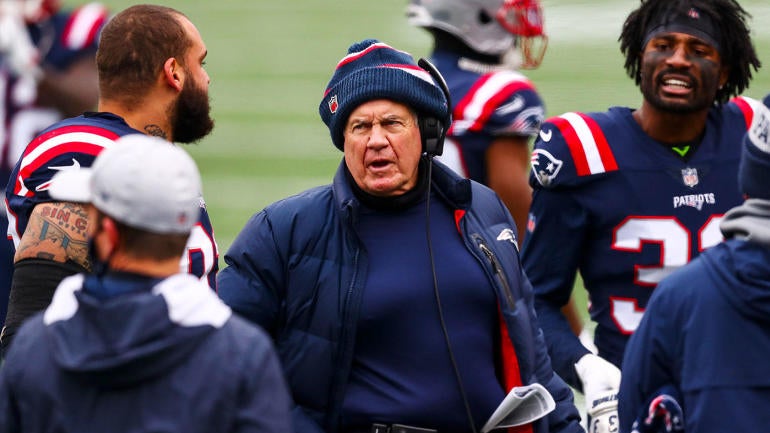
Overall, NFL teams were more measured financially at the beginning of free agency compared to previous years because of the salary cap dropping from $198.2 million in 2020 to $182.5 million this year. Nonetheless, a select group of players were still able to make out like bandits on the open market.
Here are 10 contract-related thoughts and observations relating to free agency and the early part of the offseason.
1. Bill Belichick means business
Patriots head coach Bill Belichick decided the Patriots needed a major infusion of talent after going 7-9 in 2020. He hadn't had a losing season since 2000, his first one as New England's head coach.
Typically, the Patriots rarely make a splash in the first wave of free agency. Armed with an abundance of salary cap space, the Patriots were uncharacteristically aggressive. New England signed 12 players who weren't with the team in 2020 to contracts totaling $242.245 million with $139.8 million of overall guarantees. Performance bonuses make these deals worth as much as $262.445 million.
Most notably, tight ends Hunter Henry and Jonnu Smith received three- and four-year deals averaging $12.5 million per year. The duo is tied as the NFL's third-highest paid tight ends behind George Kittle and Travis Kelce, whose deals with the 49ers and Chiefs average $15 million and $14,312,500 per year, respectively. Smith's $31.25 million is the most ever fully guaranteed in a tight end contract. Matt Judon was brought in from the Ravens on a four-year, $54.5 million deal with $32 million in guarantees to help boost a weak pass rush.
2. The void is in vogue
Voiding/dummy years in NFL contracts aren't a new concept. Teams are now liberally using voiding/dummy years in order to prorate a signing bonus over more years to help combat the $15.7 million drop in the salary cap. Defensive end J.J. Watt's two-year, $28 million contract with the Cardinals -- that is worth a maximum of $31 million through salary escalators and incentives -- is a prime example. Since three contract years for 2023 through 2025 that automatically void on the last day of the 2022 league year were added, Watt's $12 million signing bonus is prorated for five years at $2.4 million annually, rather than $6 million in both 2021 and 2022. Watt's 2021 cap is $4.9 million when it would have been $8.5 million without the inclusion of the voiding/dummy years. There is a cost to manipulating the salary cap in this manner. The Cardinals will have a $7.2 million cap charge in 2023 when Watt's 2023 through 2025 contract years void that March from the signing bonus proration associated with those years.
3. The future is now in Tampa
Shortly after winning Super Bowl LV, the Buccaneers stated a goal of keeping the core together for another championship run despite a salary cap crunch and several key players having expiring contracts. Linebacker Lavonte David was the first to return. He signed a two-year, $25 million contract before free agency started. David's deal was revealing because the Buccaneers abandoned their preferred "pay as you go" contract structure where a player's cash and salary cap numbers are the same in each contract year because there isn't a signing bonus that would be prorated over the life of the contract (for a maximum of five years). Not only did David's deal include a fully guaranteed roster bonus that's prorated just like a signing bonus, three dummy/voiding years were added to lower his 2021 cap number.
Quarterback Tom Brady freed up $19.3 million of cap space with a one-year, $25 million contract extension running through the 2022 season with three dummy/voiding years. His $20 million signing bonus -- of which $15 million is deferred until 2022 -- and $20 million fully guaranteed roster bonus are prorated over the five years.
The Buccaneers have yet to lose any key free agents. Wide receiver Chris Godwin was given a $15.983 million franchise tag. Edge rusher Shaquil Barrett signed a four-year, $68 million contract with $34.5 million fully guaranteed (worth a maximum of $72 million through salary escalators). Tight end Rob Gronkowski signed a one-year deal for $8 million with another $2 million in incentives. Kicker Ryan Succop received a three-year, $12 million contract. Defensive tackle Ndamukong Suh is reportedly on the verge of signing a one-year, $9 million deal worth up to $10 million in incentives.
All of these contracts are structured similarly to Brady and David's deals. The deals have bonus proration and voiding/dummy years were used. There are going to be some hefty cap charges if the deals aren't extended before the voiding date. The Buccaneers will have a $24 million cap hit for Brady in 2023 if he decides to retire after the 2022 season when he is 45 years old.
4. It starts in the trenches
Offensive linemen continued to be paid a premium in free agency. Joe Thuney became the NFL's first $15 million-per-year interior offensive lineman on a player-friendly contract. He signed a five-year, $80 million deal with the Chiefs averaging $16 million per year. The previous standard had been the four-year, $56.55 million extension averaging $14,137,500 per year Brandon Brooks received from the Eagles during the middle of the 2019 season. Thuney also raised the bar for guarantees in offensive guard contracts. He has $46.89 million of guarantees. Thuney being the league's highest-paid offensive guard could be short-lived. Thuney's $16 million per year should serve as the floor for Brandon Scherff, who was franchise tagged for a second straight time by the Washington Football Team, and Quenton Nelson. The Colts are interested in signing Nelson to an extension.
Technically, Corey Linsley and Trent Williams became the league's highest-paid center and offensive tackle, respectively, on deals more team friendly than Thuney's contract. Linsley signed a five-year, $62.5 million contract with the Chargers averaging $12.5 million per year. The deal has $26 million in guarantees. Of the $26 million, $9 million doesn't become fully guaranteed until next March on the second day of the 2022 league year, but things would have to go really wrong for Linsley to be released before vesting occurs.
On the surface, Williams is the highest-paid offensive tackle ever at $23.1 million per year, eclipsing the $23 million per year David Bakhtiari received from the Packers in a four-year extension last season. Williams signed a six-year, $138.6 million contract to return to the 49ers after the Chiefs made a strong push for him. There are $45.1 million in guarantees. Williams' $30.1 million signing bonus is the largest ever in an offensive lineman contract.
The deal is structured with the 49ers having to exercise an option for the final three years (2024 through 2026) worth $77.31 million by April 1, 2023. An additional $10 million of Williams' $19.4 million 2023 base salary becomes fully guaranteed with the option being picked up. Declining the option would mean Williams has a three-year deal for $60.75 million, which still makes him the third player in the $20 million-per-year offensive lineman club with Bakhtiari and Laremy Tunsil.
5. Soft wide receiver market
Pass catchers were in for a rude awakening on the open market. A deep wide receiver draft class has been a contributing factor. Initially, only Corey Davis quickly signed a lucrative multi-year contract. The Jets gave Davis a three-year, $37.5 million deal with $27 million fully guaranteed.
Will Fuller was the first to shift gears to a one-year "prove it" route because interest in the type of long-term deal he was anticipating never materialized. He signed a one-year, $10,058,235 deal worth up to $13,058,235 through incentives with the Dolphins. JuJu Smith-Schuster returned to the Steelers for another year. His one-year deal is for $8 million.
The expectation was Kenny Golladay would be the primary beneficiary of the Buccaneers and Bears designating Chris Godwin and Allen Robinson as franchise players, respectively. His market was slow to develop before the Giants signed him to a four-year, $72 million contract worth a maximum of $76 million with incentives. The deal has $40 million of guarantees where $28 million is fully guaranteed.
Amari Cooper signed a five-year, $100 million contract with $60 million in guarantees -- of which $40 million was fully guaranteed at signing -- to remain with the Cowboys in free agency last year. It would be interesting to see whether Cooper could get the same money had he been a free agent this year instead.
6. Prove it/bridge deals
More players are taking "prove it" or bridge deals because of the free agent market failing to develop as expected. In addition to wide receivers Will Fuller and JuJu Smith-Schuster, edge rusher Haason Reddick, cornerback Patrick Peterson and linebacker Jayon Brown are some of the more notable free agents who signed for one year. Despite a breakout 2020 season in which Reddick's 12.5 sacks tied for fourth in the NFL, he signed a one-year, $6 million deal with the Panthers worth as much as $8 million through incentives. Peterson took a fully guaranteed $8 million with another $2 million in incentives from the Vikings. Brown returned to the Titans on a one-year, $5.3 million deal with an additional $750,000 in incentives.
Yannick Ngakoue went for a bridge deal after a disappointing 2020 season. He forced a trade from the Jaguars to the Vikings because he refused to play under his franchise tag. Ngakoue was reportedly seeking more than $20 million per year during acrimonious negotiations in 2019 as he was entering the final year of his rookie contract. In order to get out of Jacksonville, he agreed to play the 2020 season for $12 million, which was $5.788 million less than his franchise number. Ngakoue was subsequently traded to the Ravens. He only received limited action in Baltimore's two playoff games. This led to Ngakoue signing a fully guaranteed two-year, $26 million deal with the Raiders that prevents him from being designated as a franchise or transition player. Ngakoue will be a 27-year-old free agent in 2023 when the salary cap should have rebounded.
7. A run on pass rushers
Pass rushers were the hottest commodities in free agency. Six edge rushers (Shaquil Barrett, Bud Dupree, Leonard Floyd, Trey Hendrickson, Matt Judon and Carl Lawson) signed multi-year contracts averaging either at least $15 million per year or that had $30 million or more in guarantees. Dupree's $35 million is the most in guarantees. Barrett has the highest average yearly salary at $17 million per year.
Dupree is the latest example of a serious injury in a contract year no longer being the kiss of death financially for free agency. He was well on his way to his second consecutive double-digit sack season with the Steelers when he tore his right ACL in early December. Dupree had eight sacks in 11 games. His five-year contract with the Titans averages $16.5 million per year and is worth up to $85 million with incentives. Dupree expects to be 100% by the time training camps open during the latter part of July.
It is a little surprising that none of the edge rushers were able to top the deal Trey Flowers received from the Lions in free agency two years ago. Flowers signed a five-year, $90 million contract containing $56 million in guarantees where $40 million was fully guaranteed at signing.
The one defensive lineman to easily surpass Flowers was Leonard Williams, who was designated as a franchise player by the Giants for a second year in a row for $19,351,200. Williams capitalized on a tremendous contract year in which he tied for seventh in the NFL with a career-high 11.5 sacks.
He signed a three-year, $63 million contract averaging $21 million per year. Williams' $45 million fully guaranteed is the most ever in a Giants contract. The 26-year-old Williams is well positioned to collect another big payday in 2024 free agency after the new media rights deals have kicked in because a third and final franchise tag on him will be $36.72 million, 144% of his $25.5 million 2023 cap number, at a minimum.
8. Daunting dead money
NFL teams have been more willing to take on massive amounts of dead money despite the depressed salary cap. Dead money is a salary cap charge for a player no longer on a team's roster. The Eagles shattered the record for dead money related to an individual player for one league year in NFL history by trading quarterback Carson Wentz to the Colts. The trade leaves the Eagles with a $33,820,611 cap charge for Wentz. The previous record was wide receiver Brandin Cooks' $21.8 million cap charge with the Rams in 2020 because of his trade to the Texans last April. Packers quarterback Aaron Rodgers' $37.202 million is the only 2021 cap hit larger than the dead money for Wentz.
The Lions and Rams' trade involving quarterbacks Jared Goff and Matthew Stafford produced significant dead money for both sides. Goff's dead money for the Rams is $22.2 million. The Lions have a $19 million cap charge for Stafford.
9. The devil is in the details
The devil is in the details with lucrative NFL contracts because the money isn't fully guaranteed like it is in MLB and the NBA. Because of the steep drop in the salary cap, more deals were leaked by agents to the media at the maximum value using the phrases "up to," "worth" or a combination of these words. For example, quarterback Cam Newton returning to the Patriots was initially described as a one-year deal for $13.6 million. In actuality, Newton signed a one-year contract with a base value of $5.1 million. The $5.1 million consists of a $2 million signing bonus, a fully guaranteed $1.5 million base salary, $1.5 million in per-active-game roster bonuses and a $100,000 workout bonus. Newton can make a maximum of $13.6 million thanks to $8.5 million in incentives. The $8.5 million is based on Newton's playing time, the Patriots' playoff success and individual honors (Pro Bowl, All-Pro, etc.) earned during the 2021 season.
The most egregious example was the reporting of Saints quarterback Taysom Hill signing a four-year, $140 million extension. Hill restructured his contract so $11.125 million of his $12.159 million salary could be prorated to create cap room. Four dummy/voiding years were added to allow the Saints to prorate the $11.125 million at $2.225 million annually from 2021 through 2025. Hill has $35 million base salaries in his 2022 through 2025 contract years. These aren't real years because they are going to automatically void next March on the last day of the 2021 league year. Salaries used for these four years don't matter since there isn't any circumstance where Hill will be playing for the listed amount.
10. Adoree' Jackson's jackpot
Jackson was one of the only 2017 first-round picks with a fifth-year option released before his salary became fully guaranteed on the first day of the 2021 league year, which started March 17. The $10.244 million Jackson was scheduled to make with the Titans was guaranteed for injury when the option was exercised last spring. Jackson wasn't out of a job long after an injury-plagued 2020 season. The Giants signed him to a three-year, $39 million contract (worth up to $44.5 million through incentives) containing $26.5 million in guarantees. Of the $26.5 million, $13.5 million is a signing bonus. The Giants could have saved money by giving the Titans a late-round pick in the 2021 NFL Draft for Jackson where he remained on the fifth-year option to see whether a longer commitment was warranted. If Jackson had played under the fifth-year option, he would have needed to sign a two-year deal worth $28.756 million in 2022 free agency to break even with his Giants contract.
![[object Object] Logo](https://sportshub.cbsistatic.com/i/2020/04/22/e9ceb731-8b3f-4c60-98fe-090ab66a2997/screen-shot-2020-04-22-at-11-04-56-am.png)

















